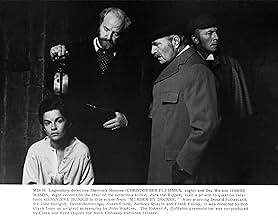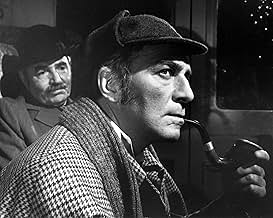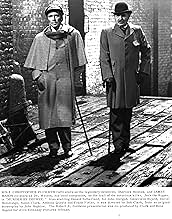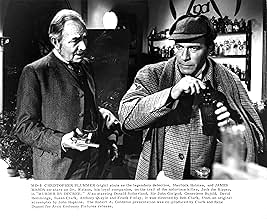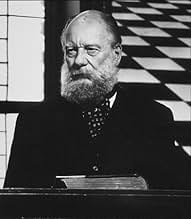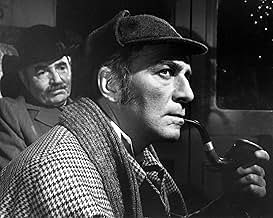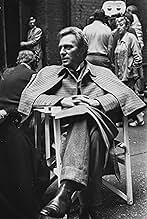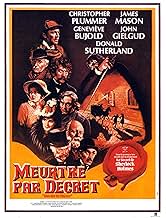AVALIAÇÃO DA IMDb
6,8/10
7,3 mil
SUA AVALIAÇÃO
Sherlock Holmes investiga os assassinatos cometidos por Jack, o Estripador, e descobre uma conspiração para proteger o assassino.Sherlock Holmes investiga os assassinatos cometidos por Jack, o Estripador, e descobre uma conspiração para proteger o assassino.Sherlock Holmes investiga os assassinatos cometidos por Jack, o Estripador, e descobre uma conspiração para proteger o assassino.
- Direção
- Roteiristas
- Artistas
- Prêmios
- 5 vitórias e 5 indicações no total
Geneviève Bujold
- Annie Crook
- (as Genevieve Bujold)
Tedde Moore
- Mrs. Lees
- (as Teddi Moore)
Avaliações em destaque
This is a remarkable little movie that has never reached classic status for some reason. Aside from an incredible cast, all of whom suit the dignified proceedings admirably, there are two other stars who lift this film above the level of an excellent thriller. One is the production design. The old Hollywood style of foggy streets and dark alleys, with sinister cabs skulking along, is the stuff nightmares are made of. The East End is horrible, a hell on earth. The other unsung hero is the music. A beautiful soundtrack which ranges from chilling strings and harps to the charming end music. Christopher Plummer is fabulous as Holmes, heroic and ingenious but with a strong sympathy which no other actor in the role apart from Jeremy Brett has captured. His scenes with Mason are a joy; the pair really work together, complete with catchphrases and a mutual respect. Donald Sutherland is also captivating as Robert Lees...his eyes are those of a man living in helpless terror. The film's finest moment is the scene between Holmes and Annie Crook. Genevieve Bujould is heartbreaking in the role,a perfect piece of casting despite her accent, and Holmes' reaction to her plight is deeply moving. Make no mistake, the theory of the Ripper murders is barmy, but wonderful entertainment. It does slander Sir Charles Warren and Lord Salisbury unbelievably; Anthony Quayle puts in a gloriously over the top turn in repulsive corruption. There is an interesting subtext to the film as well, namely the fight between decency and corruption. Annie's innocence and goodness is uncorrupted even by her plight, and the decency of Mary Kelly is a ghost that hangs over the last half an hour. The end credits are beautiful, with gorgeous theatrical and old-fashioned cast and credits, such as "Frank Finlay was Inspector Lestrade." There is decency in the most unlikely of places, and Holmes and Watson are the solid rocks while around them people sink and swim in the chaos. A moving, brilliantly realised and frightening film.
In 1888 London, Sherlock Holmes (Christopher Plummer) and Dr. Watson (James Mason) are asked by a citizen's group to find and stop Jack the Ripper. For some reason the police don't want Holmes to investigate. However he does and as the bodies pile up Holmes and Watson slowly uncover a trail that might lead to the highest reach of British government.
This was released and died VERY quickly in 1979. I'm probably one of the few people who saw it in a theatre. The critics almost unanimously praised it, it had a huge cast of good actors...but it just died. That's too bad because this is a very good Sherlock Holmes film.
It's atmospheric (LOTS of foggy streets), has exquisite production design and is beautifully directed by Bob Clark (I love the way the first murder is done--very effective). Also the acting is great. Plummer gives a very good, different interpretation of Holmes--he makes him more emotional than other actors have...but it works. Mason nicely underplays the role of Watson--he does not make him a bumbling fool like Nigel Bruce did back in the 1940s. In small roles Susan Clark, John Gielgud and especially Genevieve Bujold are excellent. Donald Sutherland, Anthony Quayle and David Hemmings unfortunately are not that good.
There are some problems with this movie though. It's too long (a long sequence involving Watson and some prostitutes could have been completely cut) and is needlessly convoluted. Also they throw politics in the plot which seems out of place. And, strangely, Holmes' deductive reasoning is almost never used. He comes across more as a protector of the people than a detective. Plummer's performance though carries it through. It's quite bloody too--not enough for an R rating but pretty strong for the PG it got back then (PG-13 wasn't a rating yet).
Reservations aside though, I think this is one of the best Holmes' film ever made. Recommended.
This was released and died VERY quickly in 1979. I'm probably one of the few people who saw it in a theatre. The critics almost unanimously praised it, it had a huge cast of good actors...but it just died. That's too bad because this is a very good Sherlock Holmes film.
It's atmospheric (LOTS of foggy streets), has exquisite production design and is beautifully directed by Bob Clark (I love the way the first murder is done--very effective). Also the acting is great. Plummer gives a very good, different interpretation of Holmes--he makes him more emotional than other actors have...but it works. Mason nicely underplays the role of Watson--he does not make him a bumbling fool like Nigel Bruce did back in the 1940s. In small roles Susan Clark, John Gielgud and especially Genevieve Bujold are excellent. Donald Sutherland, Anthony Quayle and David Hemmings unfortunately are not that good.
There are some problems with this movie though. It's too long (a long sequence involving Watson and some prostitutes could have been completely cut) and is needlessly convoluted. Also they throw politics in the plot which seems out of place. And, strangely, Holmes' deductive reasoning is almost never used. He comes across more as a protector of the people than a detective. Plummer's performance though carries it through. It's quite bloody too--not enough for an R rating but pretty strong for the PG it got back then (PG-13 wasn't a rating yet).
Reservations aside though, I think this is one of the best Holmes' film ever made. Recommended.
If you love the legendary London sleuth, dark, mysterious Victorian streets, an ample collection of plot twists, and good, solid acting, then this film is for you. It has a fine story about the meeting of the greatest detective Sherlock Holmes, Dr. Watson, and the mysterious Jack the Ripper in some of the best Victorian street settings filmed. Christopher Plummer is excellent as Holmes, giving him characteristics rarely seen in film such as humour and compassion. His Holmes is easily the most humane ever on screen, even at one point wiping tears from his face. James Mason makes a wonderful and amusing Dr. Watson. The rest of the cast is just as good and the story, although not very plausible, is nonetheless very intriguing and suspenseful.
Sherlock Holmes has been played by numerous actors, the great Basil Rathbone being the best in my humble opinion, but Christopher Plummer does a fine job in this offering. There is just the right amount of sarcastic wit in his chats with Watson. James Mason is the highlight of the movie, his portrayal of Holmes' sidekick nicely judged and at times very funny. This film is so good as a result of its main cast, all of whom are talented actors. The director manages to create a chilling atmosphere at times, whilst the style of the film is nicely British. Murder by Decree demonstrates how the Brits can hold their own in a world of Hollywood domination. Its worth a look any day.
Before the advent of Jeremy Brett "Murder By Decree" had the finest Holmes/Watson/Lestrade teaming in Christopher Plummer, James Mason and Frank Finlay. It's too bad they have such a ridiculous story.
The good: the acting is impeccable. All except a strangely dull, murmuring Donald Sutherland; and a blustery Anthony Quayle. For a more lively Victorian Sutherland catch "The Great Train Robbery."
The bad: everything else. In most Holmes movies he's bounding around London in his famous deerstalker cap and his cape. It's no different here. Holmes even wears this preposterous costume to the opera.
In 1888 Holmes and Watson were impecunious young men sharing digs until their careers took off (Watson wasn't yet married). Here, in 1888, they are prematurely aged, like two old codgers unable to get by alone on their pensions.
The story this is based on (I read Stephen Knight's book when I was young and impressionable) has long been exploded. Of course, in a work of fiction (and Holmes stories are all fiction) they can do what they like but I'd rather have seen this Holmes/Watson combination in a more rousing tale.
It's really silly from the first. Spooky as the empty East End streets are and fine as they are in setting a mood, the streets in the East End of London were teeming with people day and night. One of the biggest mysteries of Jack the Ripper (if one hand was "Jack the Ripper"--we know the blanket name grouping a series of similar murders was an invention of the sensational "fake news" press) is how the victims were all taken to secluded areas. Obviously, the murderer(s) had to be denizens of that area, knowing where to go for seclusion and how to escape swiftly.
Other silly points of this story are the closed carriage. The thing about so-called Jack the Ripper is the facility with which he or she or they came and went with no one noticing anything. A fancy carriage would be noticed. But so would a man in a high hat and cape carrying a patent leather Gladstone doctors' bag: the stereotypical Ripper image.
Worth watching is Mason's competent, courageous, yet still humorous Watson (though I can't imagine a doctor who bravely operated on the field of battle being squeamish about the injuries suffered by "Ripper" victims).
It's a shame because Plummer and Mason are so perfect for their parts and so good. I'd like to have seen them do other Sherlock stories! Also, I've been a Mason myself for thirty years and though I grew disenchanted with them, the Masonic stuff is half-rubbish. But as an honorable fellow who won't violate his Masonic code, disenchanted or not, I can't say which half.
Not only do we have a first rate Holmes/Watson combination, we have a subtle, extra-canonical David Hemings. But I love Plummer, Mason (odd name for this yarn) and Finlay.
The good: the acting is impeccable. All except a strangely dull, murmuring Donald Sutherland; and a blustery Anthony Quayle. For a more lively Victorian Sutherland catch "The Great Train Robbery."
The bad: everything else. In most Holmes movies he's bounding around London in his famous deerstalker cap and his cape. It's no different here. Holmes even wears this preposterous costume to the opera.
In 1888 Holmes and Watson were impecunious young men sharing digs until their careers took off (Watson wasn't yet married). Here, in 1888, they are prematurely aged, like two old codgers unable to get by alone on their pensions.
The story this is based on (I read Stephen Knight's book when I was young and impressionable) has long been exploded. Of course, in a work of fiction (and Holmes stories are all fiction) they can do what they like but I'd rather have seen this Holmes/Watson combination in a more rousing tale.
It's really silly from the first. Spooky as the empty East End streets are and fine as they are in setting a mood, the streets in the East End of London were teeming with people day and night. One of the biggest mysteries of Jack the Ripper (if one hand was "Jack the Ripper"--we know the blanket name grouping a series of similar murders was an invention of the sensational "fake news" press) is how the victims were all taken to secluded areas. Obviously, the murderer(s) had to be denizens of that area, knowing where to go for seclusion and how to escape swiftly.
Other silly points of this story are the closed carriage. The thing about so-called Jack the Ripper is the facility with which he or she or they came and went with no one noticing anything. A fancy carriage would be noticed. But so would a man in a high hat and cape carrying a patent leather Gladstone doctors' bag: the stereotypical Ripper image.
Worth watching is Mason's competent, courageous, yet still humorous Watson (though I can't imagine a doctor who bravely operated on the field of battle being squeamish about the injuries suffered by "Ripper" victims).
It's a shame because Plummer and Mason are so perfect for their parts and so good. I'd like to have seen them do other Sherlock stories! Also, I've been a Mason myself for thirty years and though I grew disenchanted with them, the Masonic stuff is half-rubbish. But as an honorable fellow who won't violate his Masonic code, disenchanted or not, I can't say which half.
Not only do we have a first rate Holmes/Watson combination, we have a subtle, extra-canonical David Hemings. But I love Plummer, Mason (odd name for this yarn) and Finlay.
Você sabia?
- CuriosidadesPeter O'Toole was originally cast as Sherlock Holmes, and Sir Laurence Olivier was cast as Dr. Watson. The two actors had not worked well together in the past, and were unable to overcome their differences for this movie.
- Erros de gravaçãoThe Jack the Ripper murders happened in 1888. Tower Bridge, which opened in 1894, is complete in several establishing shots.
- Citações
Prime Minister Lord Salisbury: You have my word.
Sherlock Holmes: [Acidly] I would prefer some more reliable authority.
- Trilhas sonorasGod Save the Queen
(uncredited)
Traditional
Arranged by Ivor Slaney
De Wolfe Music Ltd
Played at the opera
Principais escolhas
Faça login para avaliar e ver a lista de recomendações personalizadas
- How long is Murder by Decree?Fornecido pela Alexa
Detalhes
- Data de lançamento
- Países de origem
- Idioma
- Também conhecido como
- Sherlock Holmes and Saucy Jack
- Locações de filme
- Empresas de produção
- Consulte mais créditos da empresa na IMDbPro
Bilheteria
- Orçamento
- CA$ 5.000.000 (estimativa)
Contribua para esta página
Sugerir uma alteração ou adicionar conteúdo ausente

Principal brecha
What is the Japanese language plot outline for Assassinato Por Decreto (1979)?
Responda

